Welcome back to This Week in Apps, the weekly TechCrunch series that recaps the latest in mobile OS news, mobile applications and the overall app economy.
The app industry continues to grow, with a record 218 billion downloads and $143 billion in global consumer spend in 2020. Consumers last year also spent 3.5 trillion minutes using apps on Android devices alone. And in the U.S., app usage surged ahead of the time spent watching live TV. Currently, the average American watches 3.7 hours of live TV per day, but now spends four hours per day on their mobile devices.
Apps aren’t just a way to pass idle hours — they’re also a big business. In 2019, mobile-first companies had a combined $544 billion valuation, 6.5x higher than those without a mobile focus. In 2020, investors poured $73 billion in capital into mobile companies — a figure that’s up 27% year-over-year.
This Week in Apps offers a way to keep up with this fast-moving industry in one place with the latest from the world of apps, including news, updates, startup fundings, mergers and acquisitions, and suggestions about new apps and games to try, too.
Do you want This Week in Apps in your inbox every Saturday? Sign up here: techcrunch.com/newsletters
Top Stories
Google responds to the Epic Games antitrust suit, Apple appeals

Image Credits: Epic Games
As the Apple v. Epic Games lawsuit goes under appeal, Google this week filed an answer and counterclaim in the Epic Games’ antitrust litigation against the company. The tech giant and Android maker denies Epic’s allegations of antitrust behavior and instead says that it’s owed relief, as Epic Games breached the Google Play Developer Distribution Agreement (DDA) by allowing Fortnite players who download the app through Google Play to use Epic’s own payment processing technology.
This situation is similar to what took place on the App Store, where Epic Games updated its app to workaround App Store policies, and then facilitated payments through its own payments system, in violation of its legal contract with Apple. The court’s decision in Apple’s case was that Epic owed financial relief to Apple, to the tune of $6 million.
Epic Games did much of the same thing on Google Play, the counterclaim alleges. Last year, Epic submitted a build of Fortnite to Google Play which used Epic’s own direct payments system and not Google Play Billing. This submission was immediately rejected for failing to comply with Google’s policies. Epic then submitted a compliant version in April 2020, which Google now describes as “an act of deception designed to provoke litigation.” The new version had concealed Epic’s payment system in an update that was sent to both Apple and Google’s app stores. This would allow Epic to switch over to its own payment system by applying a server-side configuration change, or “hotfix,” without Google’s knowledge.
That switch was flipped on August 13, 2020. It allowed Fortnite users to choose between Google Play Billing and Epic’s own direct payments system. Now Google wants to recoup the money lost to this version, as those who downloaded the app from the Play Store could continue to use Epic’s billing, even after the app was pulled down.
Epic’s position has been that Apple and Google’s requirement to use their own in-app payment systems exclusively is a monopolistic practice that disadvantages developers. In Apple’s case, the court agreed that Apple should not block developers from sharing a link to other payment methods inside their own app or communicating to customers. It did not declare Apple a monopoly. Despite the largely favorable ruling, Apple decided to appeal its case this week, after Epic filed its own appeal.
The key factor to Apple’s appeal is that it’s also asking the court to put a hold on it having to implement changes to the App Store’s anti-steering guidelines. That means, instead of permitting developers to add links to their website and other methods of payments, things would continue as is until the appeals case was decided. That could be months or even years from now.
In terms of the antitrust complaint, Google’s situation is a bit different from Apple’s, however. Android already allows for sideloading apps — that means there’s another method of reaching Android users outside Google Play, making an antitrust claim more difficult.
Twitter adds more ads
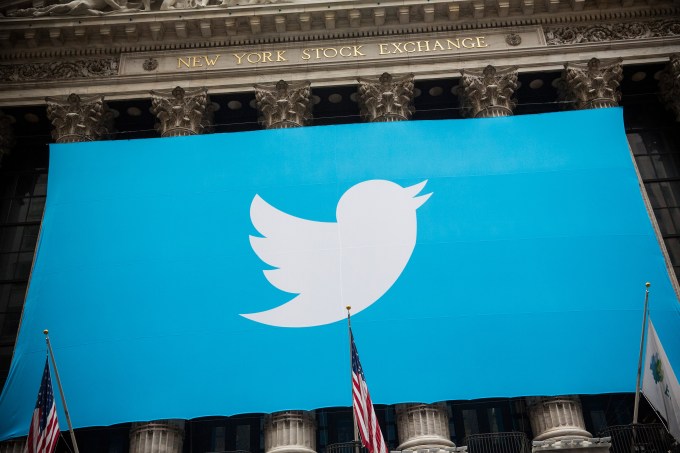
(Photo by Andrew Burton/Getty Images)
Twitter says it’s going to test a new ad format and placement on its platform. On Wednesday, Twitter Revenue Product Lead Bruce Falck said Twitter would begin showing ads on mobile devices inside conversation threads after the first, third and eighth replies. While the company stopped short of confirming the change would be permanent, it did say it would experiment with the formula to best determine the insertion points and layouts that made the most sense. Twitter also said it would consider making the display of the ads something creators would opt into, rather than forcing them to accept ads in their threads. In that case, creators would also see a share of ad revenue, Twitter said.
The company historically has struggled to grow its user base by significant numbers, meaning it’s had to get more creative with maximizing the revenue it’s able to extract from its existing users. Despite a flurry of new product development — which has included creator tools, subscriptions, audio chat rooms, tipping and more — Twitter has not yet had a runaway hit. For example, third-party data indicated recently Twitter’s new creator platform called Super Follow had only generated around $6,000 in its first two weeks live in the U.S. and Canada, or perhaps a bit more ($12,400 during 17 days in September, according to a second firm’s analysis).
Meanwhile, Twitter made a promise to investors that it will be able to double its revenue from $3.7 billion in 2020 to $7.5 billion or more in 2023. If the new products don’t turn a sizable profit, increasing Twitter’s ad load could help. Unfortunately, monetizing conversations like this could encourage users to post more content they hope to make viral. That could impact Twitter’s content and culture. Twitter is already a place that tends to reward a sort of performative type of user — like those posting snark, jokes, angry tweets and other emotive content; tying tweets’ “virality” to creator revenue could push Twitter even further away from the genuine, thoughtful conversations the company claims it wants to host.
Weekly News
Platforms: Apple
- Apple announced it’s hosting yet another fall event, taking place on Monday, October 18 at 10 AM PT. It’s expected this event will focus on new Macs and MacBook Pros, but there could be news for cross-platform app developers that will make it worth tuning in.
- Apple released the fourth developer betas for iOS 15.1, iPadOS 15.1, tvOS 15.1 and watchOS 8.1 and the betas for public testers. iOS 15.1 lets you turn off Apple TV and Apple Watch keyboard notifications on iPhone.
- Compose for Wear OS enters Developer Preview after several alpha releases. Compose for Wear OS aims to simplify and accelerate UI development, with built-in support for Material You to help developers create apps with less code.
Platforms: Google
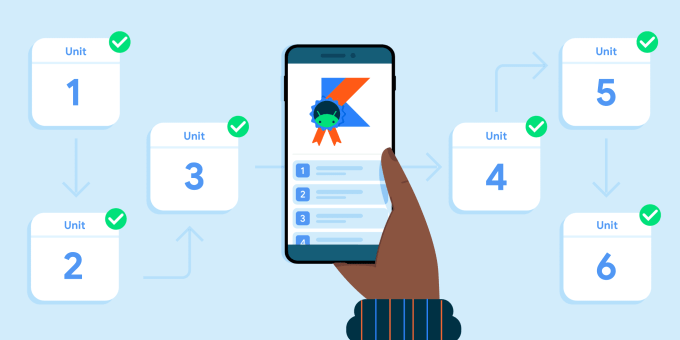
Image Credits: Google
- Google announced the final unit in its self-paced programming course, Android Basics in Kotlin, has been released, and the full course is now available. The course is organized into units, where each unit is made up of a series of pathways. At the end of each pathway, there is a quiz to assess what developers learned so far. If you complete the quiz, you earn a badge that can be saved to your Google Developer Profile.
- Google’s iOS design chief, Jeff Verkoeyen, announced on Twitter that his team would begin to phase out the open source Material components libraries for iOS in favor of Apple’s own UIKit. “It’s now been almost ten years now since we set out on this journey, and many of the gaps MDC had filled have since been filled by UIKit — often in ways that result in much tighter integrations with the OS than what we can reasonably achieve via custom solutions,” he said.
- An app teardown revealed Google may add a Digital Car Key feature in an upcoming Play Service update. At Google I/O, Google had announced it would add Digital Car Key support in Android 12.
- Google SVP Hiroshi Lockheimer, in a tweet, asked Apple, err “folks,” to support RCS (an upgrade to SMS) on the iPhone.
E-commerce/Food delivery
- DoorDash introduced a self-serve ad platform that allows marketers to reach customers on the app and grow their business. The company already allowed ads that offered things like free delivery or discounts, plus banner ads. But is the first time it’s offered ads above the search results.
Augmented Reality/VR
- HTC released its new Vive Flow VR headset, designed to simplify the VR experience for older adults or anyone else who wants an easier experience. The headset connects wirelessly to an Android smartphone and uses the phone as a combination remote and touchpad.
Social
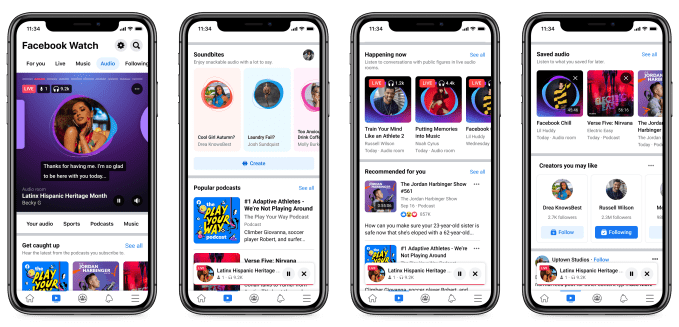
Image Credits: Facebook
- Facebook launched an “Audio” hub in the U.S. for podcasts, live audio and short-form clips, called “Soundbites.” The company is also making its Clubhouse rival, Live Audio Rooms, more broadly available to global users, and is now rolling out the new product Soundbites, a sort of TikTok for audio offering short audio clips.
- Twitter launched support for Ticketed Spaces on Android users in the U.S. The feature allows creators to charge entry fees for their voice chat rooms — a rival to Clubhouse and others. The initial Ticketed Spaces rollout for iOS users was in late August. To use the feature, users must be over 18, have hosted three Spaces in the last 30 days and have at least 1,000 followers.
- After Facebook saw one of its longest outages in recent years, the company announced it would test a new Instagram feature that will notify users when an outage or other technical issue is taking place. The company said it wouldn’t send a notification every time, but if it sees users are confused and looking for answers, it may.
- Reddit launched a new posting format called “Predictions” which allow users to guess the answers to timely questions like “who will win the game tomorrow?” or “how much will the price of Bitcoin move by Monday?,” among others. Participants get 1,000 tokens to get started, but can’t earn any more during the tournament — only by having their predictions prove correct in the end.
- TikTok, in a transparency report, says it removed 81,518,334 videos for violating its community guidelines or terms of service from April 1-June 30, 2020, which represents less than 1% of the total videos posted. This also means that during that quarter, 8.1 billion+ videos were posted on TikTok, averaging out to about 90 million videos posted each day.
- TikTok also added new mute options for livestream comments, which enable them to mute comments from individual viewers within streams for various time periods.
- Instagram added new scheduling and “practice mode” features to allow people to promote their Instagram Live in advance and be able to connect with guests to test equipment and prep before the Live begins.
- Snapchat’s app experienced an outage that prevented users from posting messages for hours on Wednesday. The source of the outage wasn’t detailed, but followed a significant Facebook outage which took down Facebook’s suite of apps for a good part of a day.
Messaging
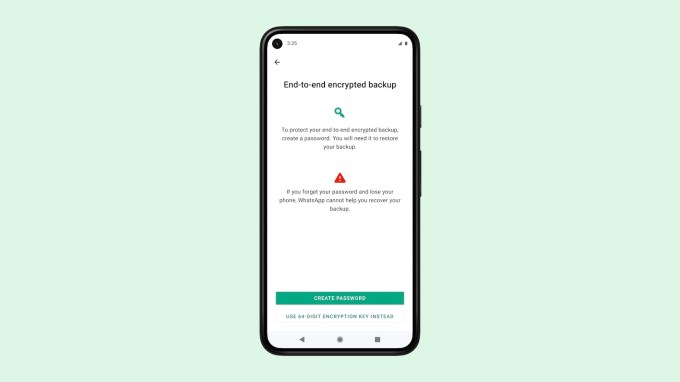
Image Credits: WhatsApp
- WhatsApp now allows users to encrypt their chat backups in the cloud, plugging a major hole that had allowed governments to snoop on private conversations between users. The system supports both Apple’s iCloud and Google Drive for Android users. Mark Zuckerberg noted that WhatsApp is the first global messaging service at this scale to offer end-to-end encrypted messaging and backups.
Gaming
Image Credits: Roblox
- Roblox co-founder and CEO David Baszucki, at the company’s annual developer conference, outlined plans to modernize player avatars, introduce new in-game monetization streams and streamline the experience for developers. Instead of Roblox’s classic, block-like avatars, the new avatars will look more life-like (and more like metaverse rival Fortnite). Also new is support for layered clothing, “dynamic heads” (facial animations for avatars rolling out for developer access), expanded access to voice chat, limited edition items, and a new development system called Open Cloud. The latter supports creating content in third-party tools, then exporting it to Roblox.
- Google’s Stadia game streaming service brings its “direct touch” controls to iOS. The feature, which launched on Android devices earlier this year, allows for mobile-like touchscreen presses that control the games, instead of hardware controllers.
Dating
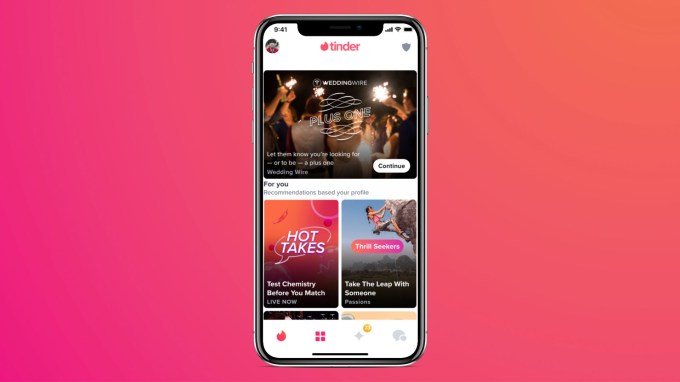
Image Credits: Tinder
- Tinder released a new “Plus One” feature that helps users find a wedding date. The feature is accessible within Tinder’s Explore section, which launched last month and offers ways to discover matches by interests and more. The dating app is also partnering with WeddingWire, a wedding planning resource company, to help single guests cover the costs of wedding season through a new Wedding Grant giveaway.
Utilities/Other
- Disney’s newest digital service, Disney Genie, is launching on October 19 at Walt Disney World Resort. The service, first unveiled in August, is an update to the company’s earlier line-reservation tools for Disney’s parks, allowing guests to plan and update their itineraries, book time slots for the most popular attractions and optionally purchase paid access to the fast lanes’ “Lightning Lane” entrances, either à la carte on top attractions or through the “Genie+” add-on. At the core of the Disney Genie experience is a smart trip-planning capability that maps out a personalized itinerary based on which rides, attractions or food and entertainment experiences guests want to make sure to do while at the parks. This is rolling out to the My Disney Experience app, and will accommodate real-time scheduling changes — like if you decide to take a detour on your route or head back to the hotel for a break, for instance. The feature could potentially put some third-party itinerary apps out of business, given Disney will have the advantage of leveraging its own park data and real-time updates, like ride closures and the like.
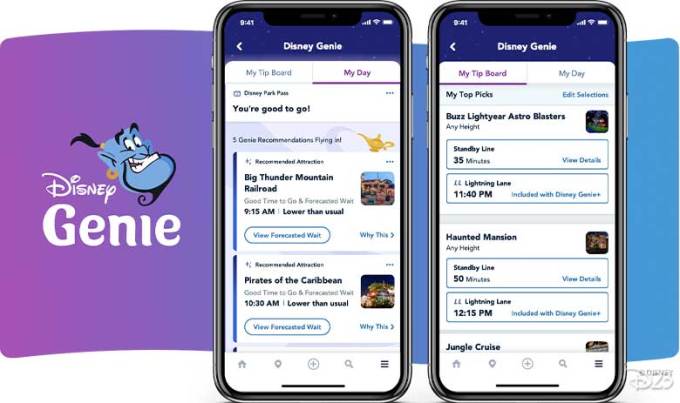
Image Credits: Disney
- Google said it’s changing the way search works on mobile devices in the U.S. across both the mobile web and its Google app for iOS and Android. Now, when you reach the bottom of a set of search results on your phone, you won’t have to tap to go to the next page. Instead, the next set of results will automatically load so you can continuously scroll down to see more information. The rollout started on Thursday on English-language search results.
- Apple updated its Apple Support app, adding support for in-app access to the AppleCare+ Express Replacement service along with other improvements. The service allows users to request a replacement iPhone without first needing to ship in their damaged device.
- Alongside Tile’s new product lineup of lost-item trackers, the company also introduced an updated Tile app that will include a new “Lost and Found” feature that allows anyone who finds a lost Tile to scan a QR code to get access to the owner’s contact information to coordinate a return. A coming update will also allow non-Tile device owners to use the app to scan for nearby Tiles, if they fear being stalked.
Government & Policy
- Apple removed from the Chinese App Store a popular ad-blocker app called 1Blocker, claiming the app is a VPN and the developer doesn’t have the proper license. The developer, on Twitter, replied that the app does not have VPN servers and plans to appeal the decision.
- Microsoft is pulling LinkedIn from the Chinese market later this year, following an increase in the regulatory changes in the country and tension between Microsoft and China, specifically. Two weeks ago, Microsoft decided to block the profiles of certain U.S. journalists in China, for example.
Security & Privacy
- Apple’s iOS 15.0.2 update addressed a memory corruption vulnerability that was actively exploited in at least one case. The update also addresses a number of other glitches in iOS 15 (and iPadOS 15), including one problem that caused the iPhone Leather Wallet and with MagSafe not to connect to Find My, a bug that could cause AirTags not to appear in the Find My Items tab, and another that caused CarPlay to fail to open audio apps or to disconnect during playback.
- Google pulled ads for “stalkerware” apps that would encourage prospective users to spy on their spouses’ phones. The apps were designed to be installed surreptitiously and without the device owner’s consent and have been used by abusers to spy on the phones of their spouses.
Funding and M&A
 Nigerian neobank Sparkle closed on $3.1 million in seed funding to continue to scale the company, which now includes support for SMBs, in addition to consumers.
Nigerian neobank Sparkle closed on $3.1 million in seed funding to continue to scale the company, which now includes support for SMBs, in addition to consumers.
 Berlin-based health tech app Mayd raised €13 million ($15 million) in seed funding from 468 Capital, Earlybird and Target Global for its app that delivers medications to Europeans’ doors in as fast as 30 minutes.
Berlin-based health tech app Mayd raised €13 million ($15 million) in seed funding from 468 Capital, Earlybird and Target Global for its app that delivers medications to Europeans’ doors in as fast as 30 minutes.
 Digital lending startup Tala raised $145 million for its Android app used by more than 6 million customers across Kenya, the Philippines, Mexico and India. Upstart, a company founded by ex-Googlers Dave Girouard, Anna Counselman and Paul Gu, led the round.
Digital lending startup Tala raised $145 million for its Android app used by more than 6 million customers across Kenya, the Philippines, Mexico and India. Upstart, a company founded by ex-Googlers Dave Girouard, Anna Counselman and Paul Gu, led the round.
 Intro, an app that connects experts with those in need of advice through personalized video calls, raised a $10 million seed round, led by Andreessen Horowitz. Other investors include Seven Seven Six, CAA founder Michael Ovitz, Goldman Sachs CEO David Solomon, 23 & Me CEO Anne Wojcicki, Kevin Durant and Tiffany Haddish.
Intro, an app that connects experts with those in need of advice through personalized video calls, raised a $10 million seed round, led by Andreessen Horowitz. Other investors include Seven Seven Six, CAA founder Michael Ovitz, Goldman Sachs CEO David Solomon, 23 & Me CEO Anne Wojcicki, Kevin Durant and Tiffany Haddish.
 Mobile app monetization provider InMobi acquired London-based performance insights platform Appsumer. According to InMobi, Appsumer’s self-serve tech platform, intellectual property and team will support InMobi’s end-to-end content, monetization and marketing stack following the deal’s closure. Financial terms weren’t disclosed.
Mobile app monetization provider InMobi acquired London-based performance insights platform Appsumer. According to InMobi, Appsumer’s self-serve tech platform, intellectual property and team will support InMobi’s end-to-end content, monetization and marketing stack following the deal’s closure. Financial terms weren’t disclosed.
 Mental healthcare app ThoughtFull raised $1.1 million in seed funding in one of the largest seed rounds raised for a digital mental health startup in Southeast Asia. Investors include The Hive SEA, Boston-based Flybridge and Vulpes Investment Management, as well as family offices and angels in the Asia Pacific region.
Mental healthcare app ThoughtFull raised $1.1 million in seed funding in one of the largest seed rounds raised for a digital mental health startup in Southeast Asia. Investors include The Hive SEA, Boston-based Flybridge and Vulpes Investment Management, as well as family offices and angels in the Asia Pacific region.
 French startup Swile raised $200 million in Series D funding, led by SoftBank Group International. The round values the business at $1 billion or more. Swile allows users to add the meal vouchers provided by their company to its app alongside their personal bank card. This has allowed it to capture a 13% market share on meal vouchers in the country.
French startup Swile raised $200 million in Series D funding, led by SoftBank Group International. The round values the business at $1 billion or more. Swile allows users to add the meal vouchers provided by their company to its app alongside their personal bank card. This has allowed it to capture a 13% market share on meal vouchers in the country.
 Indian fintech app CRED is in talks to raise additional funds at a $5.5 billion valuation, just weeks after it was finalizing a round of over $200 million at a pre-money valuation of ~$3.75 billion from Tiger Global, Falcon Edge Capital and others.
Indian fintech app CRED is in talks to raise additional funds at a $5.5 billion valuation, just weeks after it was finalizing a round of over $200 million at a pre-money valuation of ~$3.75 billion from Tiger Global, Falcon Edge Capital and others.
 Corporate travel booking and expenses app Lola was acquired by Capital One, in a deal that included both the team and tech. All of Lola’s contracts were terminated, refunds issued and the app shut down.
Corporate travel booking and expenses app Lola was acquired by Capital One, in a deal that included both the team and tech. All of Lola’s contracts were terminated, refunds issued and the app shut down.
 Mental health app MentalHappy launched its app for low-cost peer support groups, backed by $1.1 million in seed funding from Northwestern Mutual Future Ventures and YC.
Mental health app MentalHappy launched its app for low-cost peer support groups, backed by $1.1 million in seed funding from Northwestern Mutual Future Ventures and YC.
 Mobile gaming startup Homa Games raised $50 million in Series A funding led by Northzone. The company specializes in hypercasual, casual, and board games, and has developed an all-in-one SDK that helps developers optimize their mobile games through analytics and A/B testing.
Mobile gaming startup Homa Games raised $50 million in Series A funding led by Northzone. The company specializes in hypercasual, casual, and board games, and has developed an all-in-one SDK that helps developers optimize their mobile games through analytics and A/B testing.
Downloads
Clash
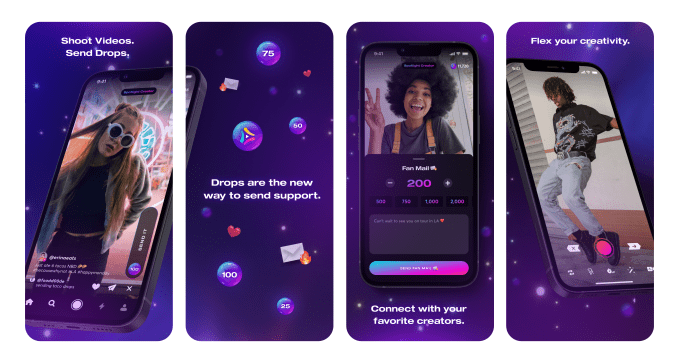
Image Credits: Clash
When Trump’s ban on TikTok failed, the short-form video app Byte exited to rival Clash — an admission of sorts that TikTok’s momentum couldn’t be beaten if it was allowed to remain in the U.S. This week, Byte’s new owner Clash relaunched its app with the “best of Byte” under the hood alongside a suite of creator tools for monetizing a fan base. And this time, the focus isn’t on beating TikTok, but working in parallel alongside it. The newly rebuilt Clash app introduces a set of tools for creators and their fans, including a virtual tipping mechanism called Drops (not to be confused with product drops, popular in e-commerce) and a paid messaging system called Fanmail. The idea is that Clash would be used with a creator’s most loyal fans who would like to have more exclusive access, a closer connection or behind-the-scenes content, among other things. Creators can cash out when they’ve earned at least $25 in Drops. The app relaunched in Byte’s place on the App Store and is arriving on Android soon. (Read the full review here.)
Monument Valley 2 (update)

Image Credits: ustwo games
The popular, but now older, puzzle game Monument Valley 2 from ustwo games just added a new chapter four years after its launch. The special chapter is called “The Lost Forest,” and is an eco-friendly update designed to promote forest conservation. Players will be encouraged to sign the Play4Forests petition for forest conservation. Said the company, the new addition is its “contribution to the Playing For The Planet Green Game Jam.”
Wisdom
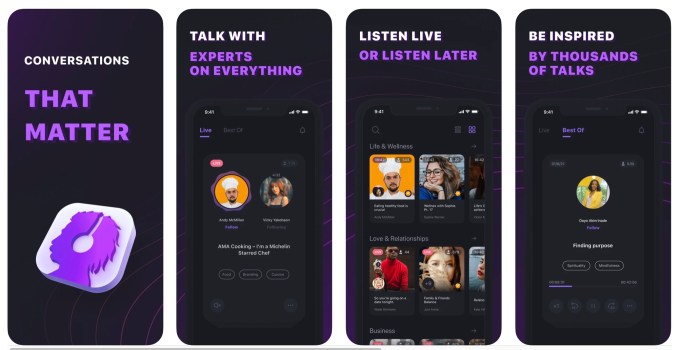
Image Credits: Wisdom
U.K.-based social audio startup Wisdom launched its new app that’s a cross between Clubhouse and MasterClass. The app offers a way for users to join audio conversations, where they can either listen or ask questions, both live and on-demand. The advice could be focused on any broad range of topics, including parenting, dating, career, finance, mental health, well-being, fitness, etc. A recommendation algorithm intends to match users to interests. At launch, 10,000 experts are signed up to offer their advice.
Powered by WPeMatico







